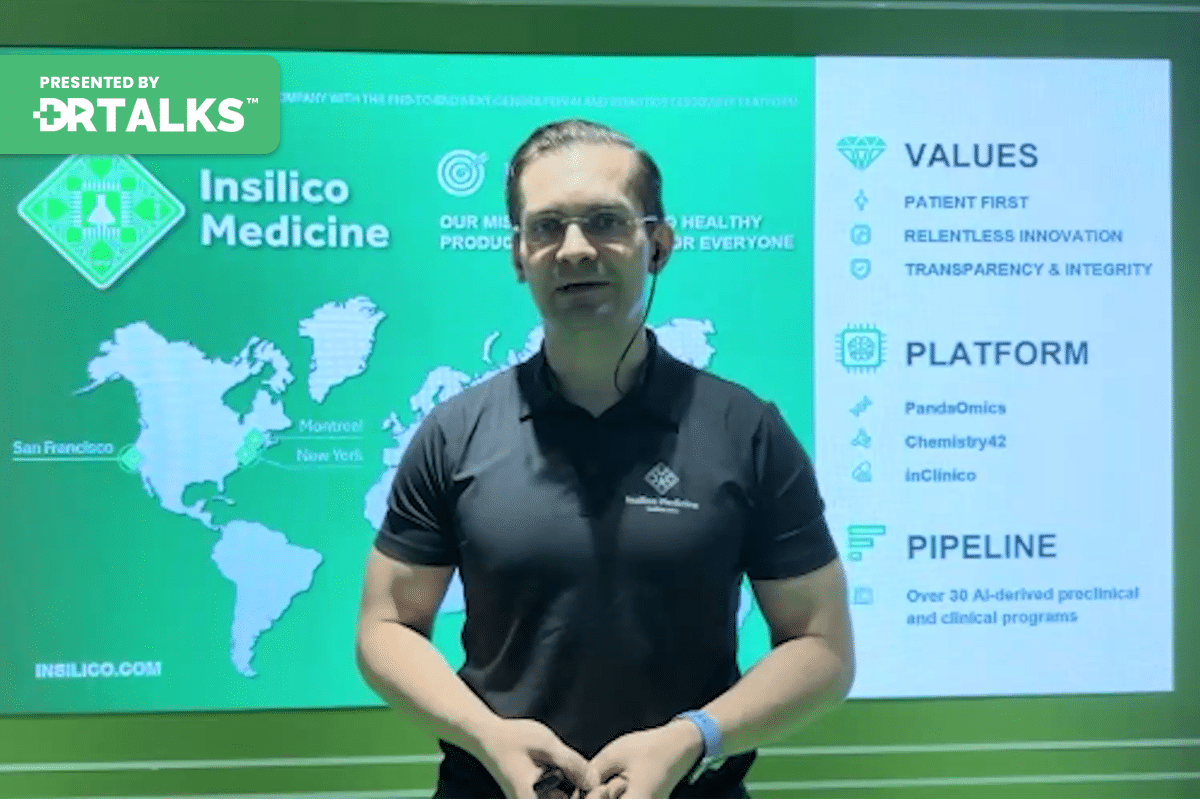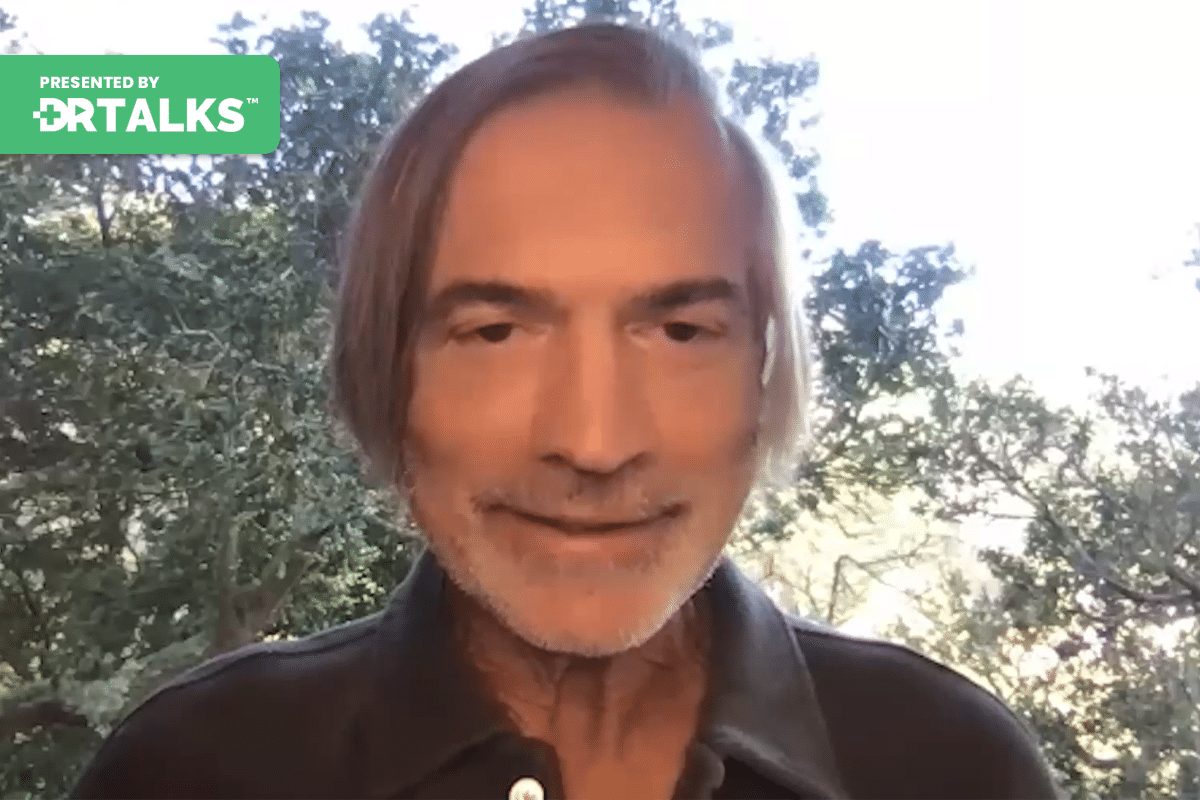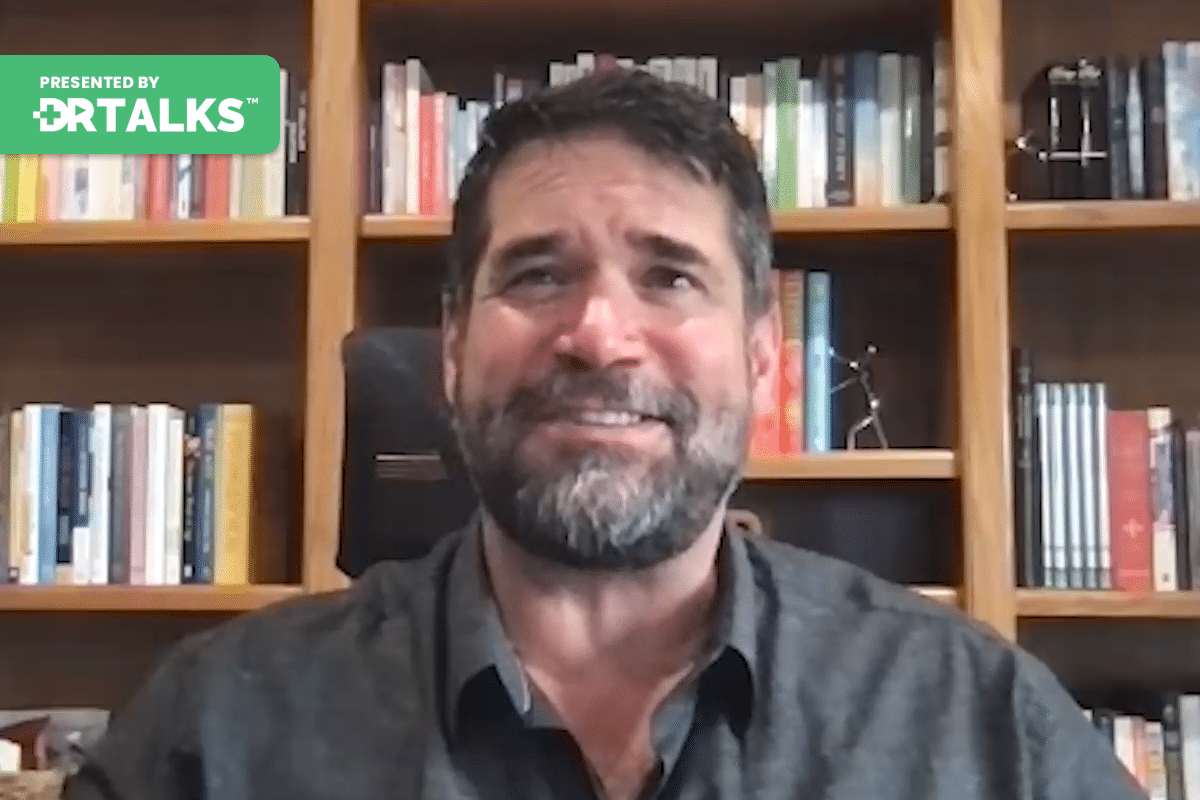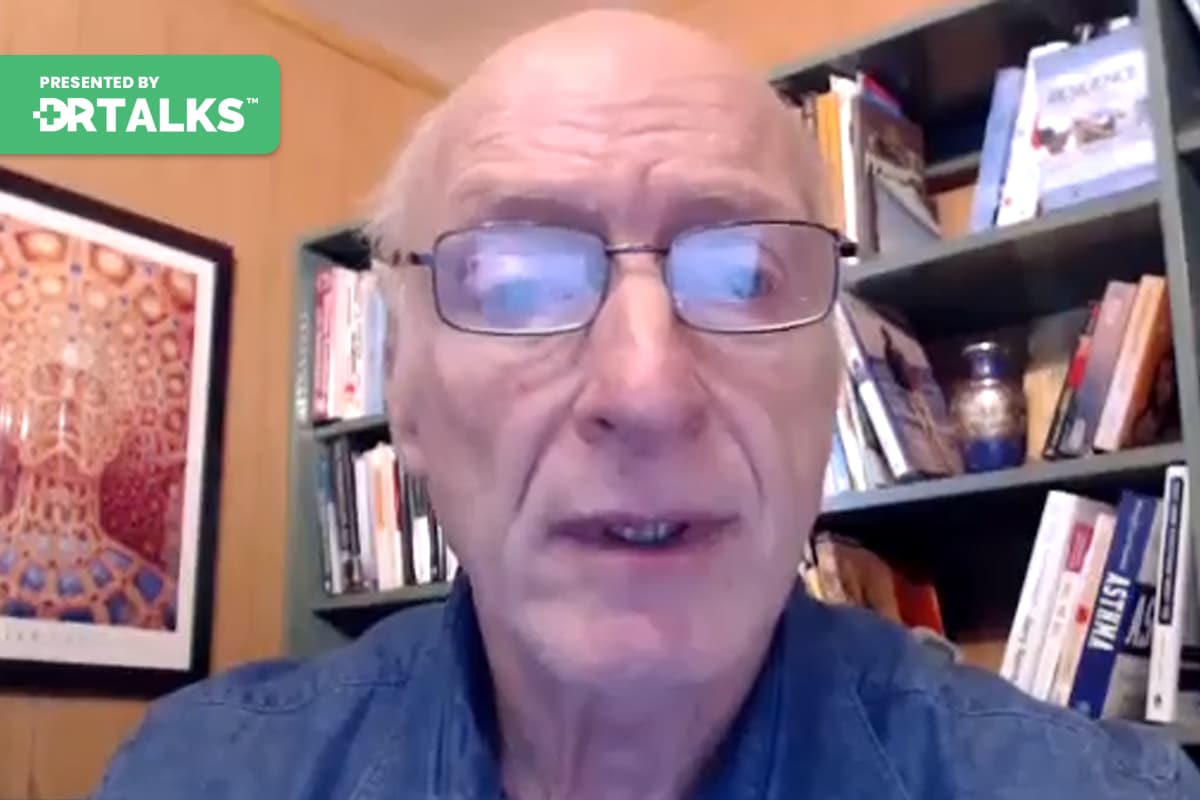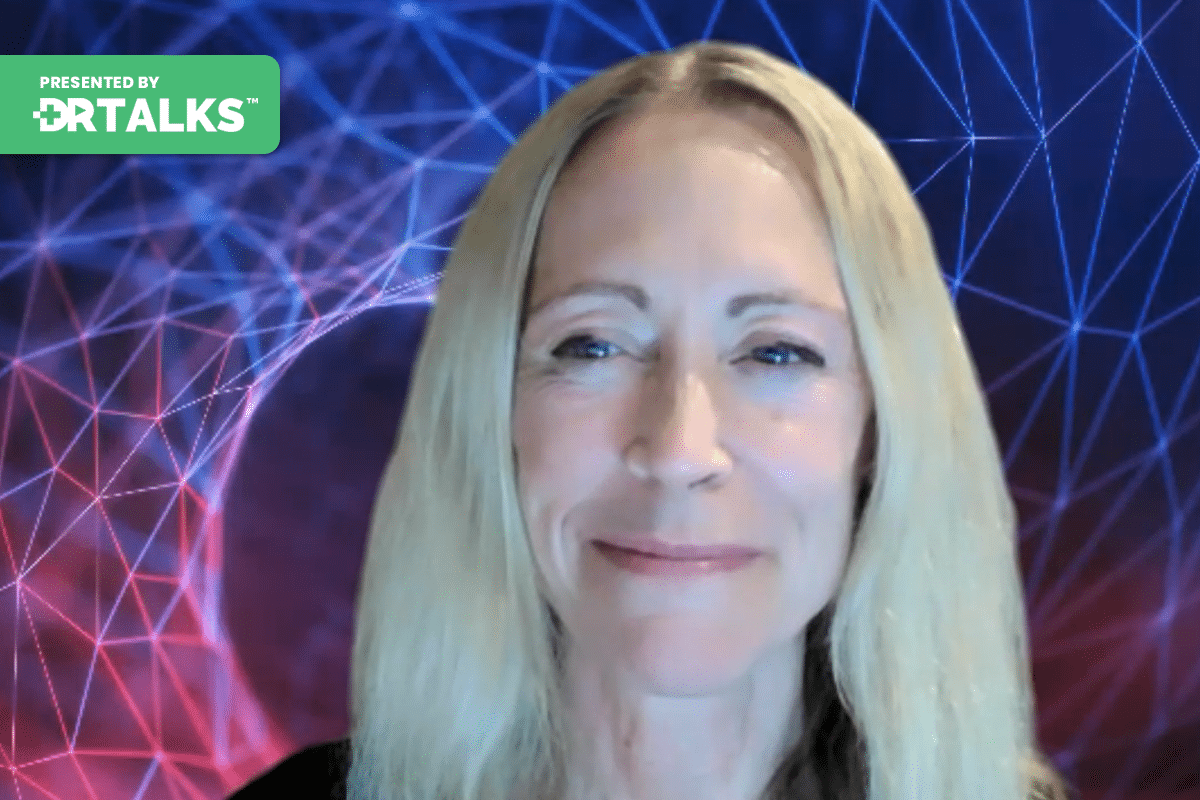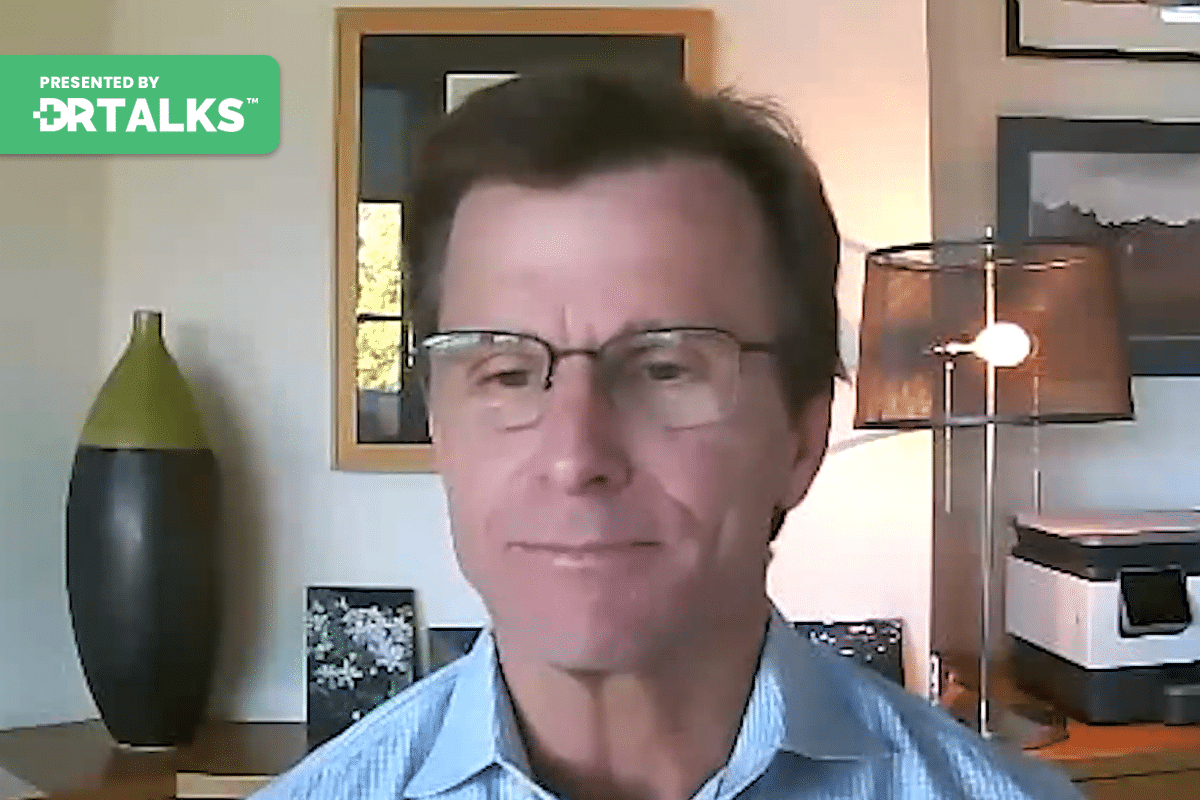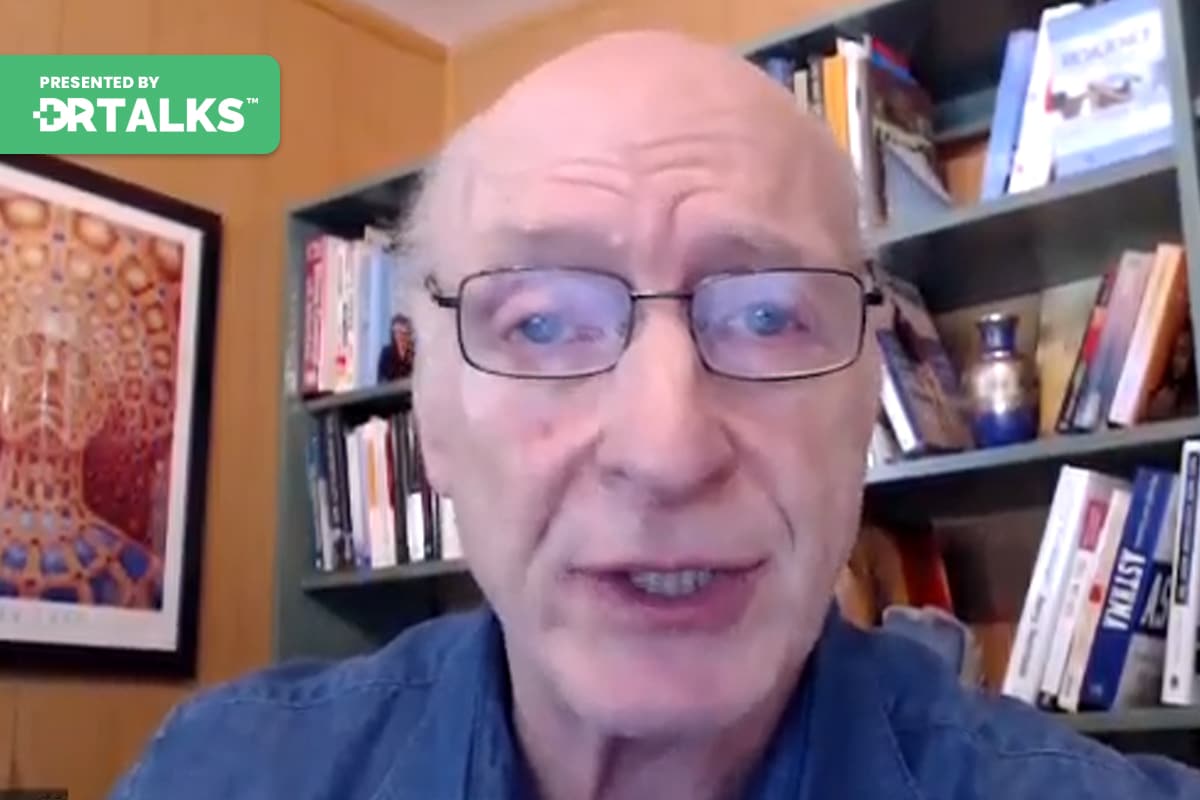Join the discussion below
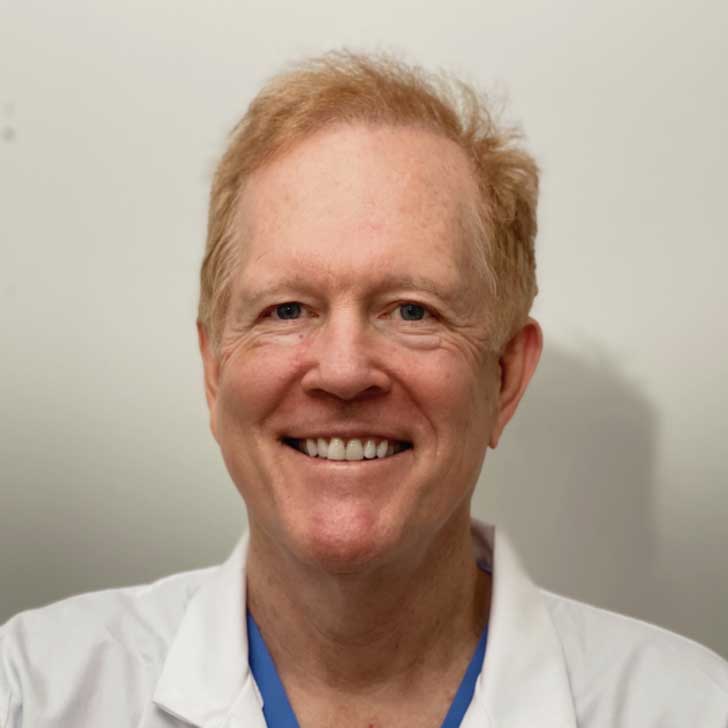
Robert is full Professor at a leading medical school and Chief of Neuroradiology at a large medical network in southern California. In addition to being a practicing physician, he is author of over 200 peer reviewed scientific papers, 32 book chapters and 13 books that are available in six languages. Read More
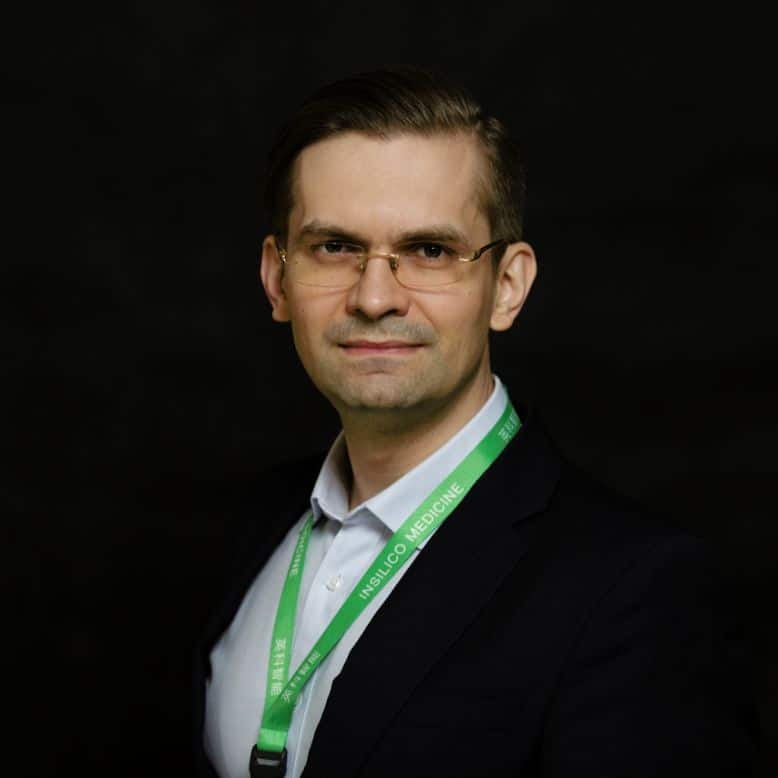
Alex Zhavoronkov, PhD, is the founder and CEO of Insilico Medicine (insilico.com), a leading clinical-stage biotechnology company developing next-generation artificial intelligence and robotics platforms for drug discovery. He is also the founder and of Deep Longevity, Inc, a spin-off of Insilico Medicine developing a broad range of artificial intelligence-based biomarkers... Read More
- Explain the different types of biological clocks
- How is artificial intelligence aiding in the study of longevity?
- Describe some breakthroughs in this area
Robert Lufkin, MD
Welcome to this episode of the Reverse Inflammaging Summit Body and Mind, Longevity Medicine. And I’m your host, Dr. Robert Lufkin. Artificial Intelligence has transformed the world and it’s also transforming longevity. And today we’re fortunate to have a true leader in this field. Dr. Alex Zhavoronkov, who has founded several companies in this space and is doing cutting edge research. Alex. Welcome to this episode.
Alex Zhavoronkov, PhD
Pleasure to be with you. Thanks for having me.
Robert Lufkin, MD
Thanks so much. I realize that this is almost one a.m. in Hong Kong where you are currently. So thank you again for making it happen at this time and for staying awake.
Alex Zhavoronkov, PhD
Well, I, that’s my life, right? So I don’t have any other hobbies
Robert Lufkin, MD
Before we, we dive into this. Maybe you could just take us a moment and fill us in a little bit about your background and how you came to be involved in this fascinating space.
Alex Zhavoronkov, PhD
So sure young, happy to present at the summit. My background is in computer science originally. So I am Latvian and Canadian. In the mid nineties, I moved to Canada that my first two bachelor degrees in computer Science and the management of information systems at Queen’s University in Canada. I was always interested in aging all my life since I remember myself probably some sort of six years of age, but I thought that computer science is the best way to obtain financial independence. And that was a really good bet. So in the early two thousand’s, I started my career in semiconductors, originally in telecommunications and then in GPU computing. So graphics processing units, those are the same semiconductors that are now powering deep neural networks that we use for AI. So serendipity and around 2004, I decided to that I want to switch my career into biotic completely. At that time, I already accumulated enough wealth to sustain myself for quite a bit. And that my grad work at Johns Hopkins that migrant workers, I’m gonna see you. So by biotechnology, discovery of novel targets and also biophysics ressam ization of amino acids in the course of aging. And then I worked for a number of biotechs startups, worked with academics very closely organized conferences.
And then I got my own lab, bioinformatics lab. And then also regenerative medicine lab worked in a clinical research center for a couple of years. And then I realized that deep learning is outperforming humans in image recognition, voice recognition, text recognition. So I kind of got into AI in the right time. So 2013. And that’s thanks to my connections, previous background in semiconductor is because my old buddies called me up and said the blue galaxy or this aging maniac or longevity maniac. So you need to come back to AI and maybe give a couple talks on bioinformatics to our AI folks because now it’s the deep learning time. So I went to NVIDIA GTC and video is a very substantial player in semiconductor is powering deep neural networks, probably the largest, one of the most important one.
I was working for their competitor before. And a lot of my buddies moved to a video. And at that conference, I realized okay now is the time. So I came back to Baltimore setup and silicone medicine. And we started originally focusing on the application of deep neural networks to target discovery target indications. So training massive deep neural networks. So think of that as algorithms that allow you to predict stuff and also generate stuff after being trained on massive amounts of data. So we started training originally on gene expression protein expression methylation data types. So those are highly variable data types that are very changed dramatically during aging and also disease.
So when you have enough of this data, deep neural networks learn to generalize and identify those minute patterns that we do not see using human intelligence that we cannot really interpret ourselves. And we started building massive disease models and also models of aging. So 2014, we were already pretty good, good at that. And then we realized that well, we now need to become commercially viable. And we decided to expand in the chemistry in order to be able to design small molecules, design drugs to specifically prosecute those targets that we identify using deep learning. So it became an end to end company. And then we scaled pretty rapidly and built a number of platforms. So software tools that now many industry players in the pharmaceutical industry are using. And so one of them is called panda comics. It’s a system which allows you to identify protein targets in a variety of diseases and aging as well. A lot of people use it, it’s pretty much industry standard. Now, we also developed a system called Chemistry 42 that a lot of pharmaceutical companies are using allows you to generate molecules with desired properties. You probably have heard about those deep fakes and stable diffusion. Now you can generate beautiful art based on textual input. So we do the same thing. But for chemistry described the molecule, you like the software makes it for you and the beauty of this platform and that’s it’s validated. So we’ve managed to many times synthesized the molecules and test them. So unlike you know, imaging text ways, biology and chemistry is something that you need to validate over long periods time.
It’s extremely expensive and you do not really see that with your own eyes, right? So you to conduct experiments. So it’s pretty validated. And then we also developed a system called in clinical that predicts the outcomes of clinical trials. Then we decided around 2020 to do a race ourselves. So we thought, well, since we’re so good at ai why don’t we start developing our own drugs? Or at least we try developing maybe one. And I decided to prioritize fibrosis. So, fibrosis is a biological process. It’s not a disease. So we need this biological process for wound healing. Essentially. Think of fibrosis as the ability to patch stuff in your body, right. So constantly to get some ruptures, you get some lesions, get some some wounds in the body. And your body naturally repairs itself. So it can repair itself up to the level where there is no scars. But when a piece to repair quickly, it creates those fiber optic patches.
I get you get five Roddick cells that take the place of the cells that just died or are regenerating. And those cells, they create a great patch, but they don’t do the useful work, right? And when you have too many patches during aging, you get you accumulate frail to accumulate this damage. And it turns to it there becomes, there is a point where this fibrosis starts driving aging. So starts driving many other age associated processes and also contributes to loss of function in many organs. So think of it and think of fibrosis in the heart, get this fiber optic tissue build up again. It’s more fragile than your native cardia.
My sites when there is change in pressure or heart rate. These things break, right? And that results in heart attacks in the kidney, it reduces the ability of the kidney to do useful work in the lung. It also reduces lung capacity. So we decided to go off to fibrosis and originally perp towards idiopathic parliamentary fibrosis. It’s a very age associated disease that kills very quickly. And we decided to develop first identifiable targets, generates more molecules for this problem. And decided to even shoot a documentary video for that. By the way, if anybody is watching with good and filmmaking, we’re now running a document on a documentary hackathon where you can go to in insilico.com/docuson and participate in the competition for cutting the footage that we’ve created over the past three years or how drugs are discovered, right? Also using AI. So we started developing this pro pro program and it turns out that, you know, A I was so good at identifying the target and generating molecule that it worked on. Every essay we tested it in you know, using human lung samples with idiopathic polymer fibrosis in many and induced models. So, animal models where we artificially induced fibrosis and then we repair it. So rescue the lung function, for example, using this drug and then we start phase zero human clinical trials. So small forward of healthy volunteers and now we are running a phase one human clinical trials. So it’s a big study also in healthy humans to see how safe those molecules are. So we young fingers crossed, hoping to get them to phase two clinical trials soon.
And it turns out that the investment investor is also recognize the value of this platform and also the many therapeutics programs that we’ve managed to launch and gave us a considerable amount of money. So we raised over $400 million 30 therapeutic programs. So now we’re truly global. So I’m presenting from Asia, but we spend pretty much the entire globe. And as you know, our mission is to extend healthy, productive longevity and hear our values. So we live by those values, we wake up with patients in mind. And that’s the only thing that we care about. So that’s a little bit about me. Another thing to know is that I have this longevity, I made this longevity pledge. So everything that I do is dedicated to longevity and I don’t plan to leave an inheritance. I don’t plan to, you know, focus on reproduction.
I only care about longevity focused projects. And on this website, so longevity pledge dot org, I outlined the projects that I’m working on and of course, in silica is the most important one, but we’re also working on education, Longevity biomarkers. I also co-founded a company called Deep Longevity spun out of silica, focusing on aging clocks. So you can find a lot of information there. And we also participate quite a bit on education so you can get free educational programs at Longevity dot degree.
There was a CME accredited free courses and if you’re a physician or actually even a medical professional that doesn’t have the medical training. And it’s just aspiring to learn about aging as a process. And also the many interventions that are coming up, you can go take longevity medicine 101 and improve your skills of longevity medicine to a one. It’s designed by the multiple physicians that we work with that are practicing longevity medicine, but also the many scientists. And we also try to combine it with our conference the University of Copenhagen every year to augment this body of knowledge and to ensure that we can educate more people so they can go and start their own companies or work for companies like calories?
Robert Lufkin, MD
Well, thank you. I have so many follow up questions on all those fascinating topics that you raised. But before, before we, before I do that, maybe you could just set the stage a little bit and tell us what, how you conceptualize longevity and aging. What’s your mental framework for it? Everybody seems to have a slightly different model on it. But how is this work informed your thinking about the way longevity and aging works.
Alex Zhavoronkov, PhD
So to me, aging is a biological process that originally you, that stems from development. So again, it starts in utero, so many of your organs and systems and the molecular level, you start aging even when you are still young, child developing embryo. And some of that damage is compensated by growth in very early life. So you reach the age of maturity where you can reproduce. I you compete to reproduce, you take care of your young, then you gradually decline and die. So evolution doesn’t need you anymore. So and the growth slows down and then almost stops. So of course, you actually continue growing in some areas. We know that you’re some of the you know, your nose, your ear is, they continue growing, but everything else stops. And the aging process is take over. We also see under the performance of some genes that you need early life being very detrimental in late life.
And once your evolution doesn’t need you anymore, after you reproduce, you continue to decline and die. And that’s aging kind of in a nutshell to me. But of course, it’s a multifactorial biological and also psychological and humans process, which basically happens at every level and goes way beyond the classical hallmarks that we know of, right. So there is a very famous paper published in the past decade, about a decade to go on hallmarks of aging. So basically, it’s a structure view on the multiple processes that drive aging and are also correlated with aging hallmarks of aging. So like cellular is in essence telomere attrition, stem cell exhaustion. So those processes transpire in all of us. And are actually many more that we’ve identified. And at the end of the day, they were to continue to decline in death.
So what we do at in silica and the way I see age actually, I can probably show you a really nice slide. So for me, in order to study aging, we started using deep neural networks. So I hope you can see my slide here. So deep neural networks are large algorithms that have multiple algorithms acting in similar ways, you know, human neurons would. And you have multiple layers of those neurons So imagine that you have many neurons on the input layer of the deep neural network and just one neuron only output, which is age. And you can train those deep neural networks on massive amounts of legit traditional data coming from people of different ages. And you can use multiple data types to train them. So my favorite ones are of course transcript Onyx proteomics. So that is gene expression, protein expression methylation, imaging data. So even pictures of your face, I mean, you can, I can probably predict your age within five years, right? Maybe 6, 7, 10, depending on, on the race as well, quite a bit. And on the way you use cosmetics products. And you can also even use a video of a person you will be able to see by, by the motion by how the person moves. You can predict age activity, blood tests behavior recently will publish the really cool paper where we use psychological tests data to predict age. And then we deacon veloute those deep neural networks to understand which features make you psychologically older or younger as well.
And then once those deep neural networks are trained you can retrain them on diseases. So add additional neurons here, for example, with the specific disease because there are much less data sets annotated with diseases. So everybody has a judge, right? And we can use age as a stage of the disease, basically think of aging as a disease for a second. We don’t need to class specifies as such. But for the purposes of AI development, it’s actually a good idea to use age as a stage of the disease. And then you just retrain those networks on diseases and then you can identify possible targets, get causal graphs.
And the most interesting advance in AI in recent years was the ability to generate novel objects, right? You seen those deepfakes beautiful are generated using AI in response to generation conditions from text and you can generate really accurate synthetic data. Now with age as a generation condition, so imagine you take a breath fit for example and say well deep neural network. Now take this template, this Brad Pitt and show me a billion of bread pits into the future with different ages, right? And also with different features saying now I want to see that Brad Pitt a little bit more Asian, a little bit more female balding hair, non balding hair. And you can create a huge population of humans in the future and study them to see how I think about their biology, about their chemistry.
And for that, you don’t need to have actual human data anymore. You can synthesize. So we do that a lot and to me again, what is aging? So you are your age and you change in time and you change in time every, everywhere, including your psychology. So, you know, if I go back 20 years, I probably 25 years, I probably wouldn’t be able to make friends with myself because we’re so different psychologically and biologically, of course, as well. So AI allows you to capture those changes in time and tell you who you are at this point in time and then extrapolate into the future. So AI is probably the best way to study aging and study this continuous degenerative process that, you know, I hate so much. That’s our only enemy. And in order to study it, AI is probably the best tool.
Robert Lufkin, MD
Yeah, I mean, one of the greatest challenges that we all face in longevity research is coming up with ways of measuring longevity, biological age, chronological age and you’ve through, through your work. And at least one of your company’s deep longevity has been developing a number of longevity clocks based on biomass and methylation and like you say, images and also mental health. My, the one of the empty part of the emphasis of this program, this summit is inflammation, but also both the mind and the body. What, what these bring to bear on aging. And my co-host, Steve Sideroff has developed a resilience clock sort of a resilience age questionnaire based on kind of his clinical experience. How would an AI developed, how would your AI developed mental health biological clock differ from one where a practitioner just sort of put it together like that. What, how did you do yours? And how does that work?
Alex Zhavoronkov, PhD
So, sure. I actually thought that, well, five years ago, I thought that most, well, psychology is not real science. Okay. I thought that it’s not exactly as important as biology. But then we started applying neural leads to massive amounts of survey data, psychological surveys and not even psychological surveys, just population research surveys. For example, my this midlife study in the U S where the government constantly surveys the population to understand the needs of the people, how population changes over time. So millions of Americans are being surveyed every year and the data is in the public domain. Some of the data is also linked to biology and there are similar studies all around the world. So also there is Chinese health and retirement study where massive numbers of millions of Chinese citizens are being surveyed annually.
And some of those surveys are also linked to biology. And again, it’s in the public domain for researchers to use. So we have this crazy idea, I thought, well, why don’t we in addition to biological data that is actually very hard to interpret, right? So where some of the algorithms we understand how they work, but then once you get the output, it’s very difficult to explain why this network is predicting somebody older or younger than their chronological age, right? So what is really important there and what features are driving in the process.
So how do we understand causality? And we decided to go to something simple, right? So to those survey questions that we could interpret as humans, right? And try to put them into some logical framework because that’s something that we can actually interpret just like pictures. The pictures are also good for studying neural networks before you go into biological data, that doesn’t make sense to humans, right? Even trained humans, like there will be a gene, let’s say sod one, right? Yes, it’s important it’s implicated in so super dispute. So some antioxidant protein, right? Yes, it’s oxidative stress. Yes, we understand the function, we understand the structure, but how it works in the general scheme of things and how it protects you from aging or accelerates aging. In some cases, we don’t know. So we decided to go to a simple data type like surveys, train the deep neural net and then realized that many of the features that are scoring at the very top. So that are important for predicting your age are highly interpretable but also are very valuable in terms of in terms of their contribution to aging and to, to your to the change in behavior. So for example, your longevity expectations. So how long do you expect to live is one of the most important feature is that defines how old do you feel and how you’re going to behave also social interactions. So if you’re lonely, you are aging faster.
If you are taking less risks, you are usually a little bit older. And there are many, many, many other features, right? And also education plays a huge role, the ability to do work also near term outlook on life. So if you think that the future is going to be worse in the next 10 years, the next 20 years, you are that’s one of the features that makes you older and it’s also driving aging. So we looked at many of those features and we realized, wow, actually, we can now manipulate your psychological age to using very simple suggestion techniques and try to turn you into a younger individual psychologically. Can we do that? And we try to also use self organizing maps. Another tool in AI that allows you to identify the features that you need to tweak in sequential order to get to the result that you desire, the desire result.
And we found we published a paper on how to use self organizing maps to identify those islands of emotional stability where we reverse aging to some extent. But at the same time maintain the level of well being on the highest level on riff scale. So we still keep you as a, as a happy person. As a matter of fact, you get happier with age, right? So nature turned us into creature is that get happier with age, even though we lose physiological function. And we understand that the future is, is going to be worse, but we actually feel happier, right? So there is a sense of self fulfillment, you get wisdom, etcetera.
And you actually feel good about yourself. I mean, otherwise you, the best alternative would be to shoot yourself a jump of the cliff, right? So evolution took care of that and ensure that we don’t do those crazy things. So that’s why we get happier. And actually understanding that you get happier while everything else gets worse is kind of, it’s a revelation for many people, right? Because they’re like, it’s like an alcoholic waking up, right? And thinking, oh, actually need to do something, maybe it’s a good idea to be psychologically younger. So, but if you choose to convince yourself that, you know, life is going to be significantly longer, for example you might not be as happy anymore because now you need to work harder and you need to get educated, right? And there are many insecurities in life, right that are coming up. So we train the algorithm to take this path that tries to avoid those islands of insecurity and emotional instability and get you to the youngest psychological age without this loss of happiness in the process. And we published a paper with Nancy at cough, the World Authority on Happiness at Harvard. So she was the senior author on the paper. And then the last paper on psychological aging, that was our coolest paper I think. With Helen Fong from the Chinese risk of Hong Kong published multiple papers with Laura Carstensen, the founder of the social emotional selectivity theory. Where we train the neural networks on this China health and retirement study data to predict psychological age and also only blood tests that were associated with every psychological survey that we could get. So there are some complete data sets to also predict biological age.
So for the first time using AI we combined biology and psychology and showed that being psychologically younger has health benefits. So you actually are slightly younger biologically as well and vice versa. So there is a lot of value in becoming psychologically younger. And that’s something that you can modify, right? So again, biology is much more difficult to tweak. But if you are psychologically younger, it looks like there is a feedback loop to biology. That’s why I also thought that for example, plastic surgery and all of those cosmetics are complete crap and they should be banned, right? But now I think that, well, maybe not because aesthetic medicine makes you look younger and that’s one of the features that makes you psychologically younger as well. So there might be some benefits of looking younger as well. So you shouldn’t be ashamed of wanting to look younger, anymore. So that’s what I’m kind of preaching to my team. So that if they want to look younger, they should look younger. It’s fine.
Robert Lufkin, MD
Yeah, that’s a fast, so many fascinating things there. It’s almost like the supplement that may or may not work. There’s no proof for it. But if the person takes it and they feel like they’re getting younger, that in itself is improving their longevity, sort of kind of a placebo effect. But it’s for a different mechanism than we usually think of at least. But so you’ve, you’ve taken these massive datasets, millions of patients and using deep learning and other AI tools, you’ve constructed models of mental health and aging longevity, biological. Now, I wonder what insights have you come to, let’s say compared to like a professional, like, like Steve, who’s been working for decades with hundreds, if not thousands of people. And you know, he could come up with models based on that clinical experience. Were there any unexpected insights from the AI that an expiry professional, psychological psychologist that surprised you, what is AI taught us that, that the humans have it?
Alex Zhavoronkov, PhD
Well, again, the multitude of features that we work with is usually vaster so broader than what a clinical psychologist would would work with and what we see is well, first of all, the difference between what we would suggest, what the AI system would suggest would not necessarily be huge from what clinical psychologist would recommend. Right? So, yes, we need to have more social interactions. So being lonely is bad, right? Being more optimistic about life, right? So that’s something that the clinical psychologist might not actually be able to explain as well as you know, the recommendation coming from the AI system because it needs to, you need to understand that you need to essentially this deceive yourself in some way to think more positively about the future. And there are various psychological tricks on how to do that.
We also looked at the difference. So now when we launched this tool, so the deep longevity company and I’m not, by the way, not employed by the company anymore, I advised them, but they launched a tool called herself. So it’s like future, but on German itself dot AI, and when they launched it and also the accompanying survey with the paper that was published immediately. I think it’s a quarter of a million people took it. So it’s a huge number, right? So and then they started using the tool and using different suggestions there and we see what they use and what is working, right? So if they read certain books, so for example, Peter Diamandis says the future is faster than you think. If they start learning a little bit more about longevity science, they read a lifespan by David Sinclair and a few others that actually provide a source of intelligent optimism. It’s much easier to convince yourself that the future is better than you think because there are a lot of examples in there, right? And it’s very nice workflow. Very nice knowledge flow that those books provide. And then people get start searching, start looking at news, watching videos on longevity and getting more familiar with the field.
So actually the weird thing about longevity technology and biotechnology is that there are not that many tools that you can use today that will help you significantly increase your lifespan or health span, right? So it’s not that far from what your mother told you, right? So diet exercise, sleep meditation, well, your mother told you how to do this, right? So eat green, don’t overeat, right? Sometimes, sometimes starve there are not that many tools in our inventory that we can recommend to patients, right? And there are promising drugs out there like Metformin Acker bows, G L T two eyes recognize and that demonstrate some effects in animals and we see some epidemiological data, but it’s far far from, you know, being considered to be a longevity drug that is established. So we need to have clinical trials. But still people, once they get into this field, they also understand the vast number of advances that are transpiring in the field. And they get more optimistic. So, and then in this case, you would say think okay, well, now I have a reason to think that I am gonna live longer than my parents did or I’m gonna formulate my longevity expectations, not using an actuarial model or this life insurance sales guy who shows me how long I’m gonna live. I can now set my longevity expectations to something that is much more ambitious than that. And of course, you need to be moderately conservative but making those life choices to decide to work longer, to set yourself on the path of lifelong learning, career planning to socialize more, to hang out more with younger people. Go back to school form relationships, talking about professional relationships with younger people. I think from AI when an AI system gives you this data, you actually trust it a little bit more very often. So there are not that many clinical psychologists who have the reputation and the ability to impose this, you know, new knowledge to the person. But when AI does it, sometimes patients believe it even more.
Robert Lufkin, MD
Yeah, we’ve seen so many clocks in, in the longevity space, you know, with Steve Horvath and the DNA methylation clocks and Morgen Levin and the fino age which in the biological clocks and now gut microbiome clocks and now a psychological clock. If what’s the trade off? Are we expected to use all these clocks or what are the advantages of a psychological clock or disadvantages versus these other clocks?
Alex Zhavoronkov, PhD
So, first of all, we’ve developed 22 clocks. So we have a clock that is based on blood tests that a lot of clinicians use because something as simple as your lab test, you know, album and glucose alkaline phosphate, Urea, album and boom different cell counts. Those are the feature is that are very easy to use for training the neural networks to predict your age, right? And those clocks that are developed using this data are reasonably accurate. So there are like plus minus six years, right? Again, I won’t be able to predict your age by looking at you in the video with that accuracy, right? So it’s actually it’s not that bad.
And the deviation sometimes from people who have a disease and who are extremely healthy is so you want this range to be pretty significant, right? Because this delta defines when you die, right? Well, it’s correlated with your mortality. So you actually want, you don’t want precise clocks that are extremely correlated chronological age because for that you have your passport, right? That number is very correlated with your current logical age. And to answer your question, there are multiple data types that we can use to predict age and every data type tells you a different story. So if we look at your face, that’s one story, right? And actually your face is a very good predictor of your age. Your hair is a good predictor of your age. You can now go into micro, so you can go into microscopic representation of the same image, right? So you go into a different level of zoom and you see now skin, for example, under a microscope and it will also tell you your age actually even more accurately than the macro picture. And that data is also valuable and then you go and look at the molecular level, right? So you extract the proteins, the ventilation and many many other things. And they will tell you a different story, right? So in every one of those levels of zoo is valuable, right? Because again, we are not just cells, right? And we’re not just connective tissue were not organs, we’re not we’re not organ systems, we are much more complex than that. Plus, we have psychology. So you need to have multiple clocks to tell you different stories. You even need to have the clocks that are, that are based on very, very, very micro scales or nano scale molecules to understand the molecular changes in your cells, in your DNA and in the microenvironment as well, and every one of those levels tells you a different story and also gives you a different path to reversing the aging clock as well.
So if you built an aging clock based on your facial image, well, just what highly modifiable, right? So get some cosmetic fillers, you know, Hillary Nick acid surgery, you will look younger, paint your hair implant some hair to the new neural network, you will look younger. Are you now younger? Biologically? Well, most likely not, maybe a little bit because of the psychological changes that you are likely to trigger, but most likely you’re not going to significantly increase your lifespan. If you are going to fix the composition of your blood, not fixed, but basically bring it as close to, you know, 30 as possible.
Is it going to significantly extend your life? Well, we don’t know and also depends on how you do it, right? You can actually do a blood transfusion from a young person to you and that will give you a blood test of a younger person. Is it rejuvenated? Well, we don’t know, maybe mildly as well, but those tools allow you to at least experiment and intelligently interpret the intervention, right? So my answer is that you need to measure everything and that’s why we need to have multi model AI platforms that can take in many different data types. And I also believe that psychology is important. Right. So young reversing psychological age is not going to dramatically extend your lifespan.
It will a little bit most likely it may, may actually decrease your level of well being if you don’t do it. Right. Right. Because if you’re just convinced that you’re gonna be living longer and you’re frail and you start getting those insecurities that now you haven’t saved enough, right? Or you need to work longer or you’re gonna be long burden to the family for a longer time. That could be pretty dramatic, right? So you need to be very careful about that too. And I think that we need to look at those glocks in a holistic way and when we’re testing different interventions, if you want to test demise. And for example, right, you don’t know which data type is going to be most reactive to this drug. Is it gonna be blood tests? Well, we don’t know which feature is in the blood test. Well, you want those blood tests to react, right? Because that’s something that the physician can, can interpret, but most likely it’s going to change the transcript tonic proteomics profiles, right? Molecular pathways that are implicated in aging. We know that it inhibits tour and we know that it has certain effects on some biological pathways that are implicated in aging and longevity. But is it going to reverse the aging clock trained on any of those data types, we don’t know, but we need to test everything. So I hope that this answer is broad as long, but you need to measure everything. There is no ideal clock.
Robert Lufkin, MD
Yeah, that it’s a great answer. And I want to be respectful of time. I one question just about clocks in general. Several people have observed that with various longevity, clock’s biological clocks, there appears to be an improvement that that most people can get with improving their diet, you know, cutting out carbs, fasting a little bit, maybe exercising more or, or the rapid mice and it’s about 10 or 20 years, but then it seems to hit a wall. Is this a fundamental limitation of our treatment, technologies be the lifestyle or pharmaceutical or is it something fundamental about the clocks that were not? I mean, you don’t want to rewind them back to be a teenager. I don’t think any of us do, but you know, why is it, why do we stop at 10 or 20 years?
Alex Zhavoronkov, PhD
And I just think that we have certain biological limitations for most of the current interventions. And that’s actually pretty mean rapper Mayas and to date from all the pharmacological interventions demonstrated the best effect in animals, right? For a drug that has an established safety profile. And it gives any Additional 20%, right. So in human terms, well, 20%, right also depends on how you administer it and we need to have more experimentation on that, but it does have some life extending effect. Analytics resulted in dramatic improvements, right. We haven’t tested them on humans, but the preliminary data looked really nice. I mean, unity just completed their phase two study on something that they call a syphilitic.
We don’t know if it’s analytic. And I think that we do have the limitations of the interventions currently. So if you were to transplant your brain into a new body, I’m pretty sure that most of the biomarkers would be reversed, right? But since we don’t have the ability to do that, and we’re just tweaking it using very primitive interventions. Yes, you will have very limited effect, right. And if you are already exercising, dieting, meditating, etcetera, etcetera, you’re living a healthy lifespan, those effects should be even smaller. What I love about some of the clocks. So that’s why my favorite data types is transcript Onyx proteomics, methylation in combination and also in combination of blood tests is that transcript nomics proteomics, you can use this data type for the discovery of novel targets. So they can create history, grams of those genes and proteins that are important in predicting age. You try to formulate a hypothesis about the role of each individual gene or protein, try to validate it using text using literature or using other types of biological evidence, do some validation and then you can discover a drug out of the aging clock, right. So many of those proteins, they are drug targets. And once you establish the role of this protein in aging and preferably in the disease, so, creating dual purpose therapeutics, you can target for example, fibrosis and aging at the same time. So you try to go after the pathways that are implicated in both and that could give you more benefit. And there you can actually intelligently calculate if you specifically impact a certain feature, a group of features that are very important for prediction.
You can now approximately estimate how much longevity benefit you’re gonna get if the drug works and reaches the clinic, Right? And actually, they’re also you get very small numbers right now from what we see, your and I probably have a list of those targets that goes, you know, into several 100 for each individual target, we estimate, you know, 20 years max. That’s like the the best case scenario. And that’s in terms of the added years to life expectancy, right? That’s not exactly age reversal may, may have some age reversal on some level of biology, but that’s, that’s the life expectancy game that you should have, you should expect.
And the question now is that if we start combining those drugs, right? So most important features, let’s say we look at top 50 and develop therapeutics that hit several of those targets and also different, combining different therapeutics. Maybe this additive effect will allow you to get a higher number in terms of age reversal. Also, we need to think about combination longevity therapy in time, right? So if you’re thinking in signal itics the world, for example, right. So those drugs that target senescent cells, well, you might want to have a very specific workflow where you try to rescue the prison essence cells, right? So try to ensure that you want to administer its analytics. You don’t kill a lot of cells that still have a good chance to be rescued.
That new administration analytics so kills in essence cells, then you induce stem cell proliferation and stem cell division, right? So think about something like G CSF, I’m just hypothesizing, right? And later you administer something like an anti if I brought it because if you kill a lot of senescent cells, there will be a lot of unpopulated niches, right? And again, the body will try to patch them with my broderick tissue. And you’re gonna have excessive number of fiber optic cells and extra cellular matrix in there. And then we administer a drug that would probably navigate those stem cells to the right niches. So, induced in vivo regeneration. And then the list goes on and on and on. Right. So, but I think that now if we just try to try to do clinical trials with just one drug, we are not going to have a huge effect, right? So we need to have those work clothes that the future is after combination therapy. Yeah.
Robert Lufkin, MD
Yeah. So many were just at the beginning and so many things we have to learn from this. But Alex, what’s the best way for people to reach you on social media, you mentioned a website before, if you could just repeat that and
Alex Zhavoronkov, PhD
So sure find me on Twitter. My Twitter handle is very simple as biogerontology pretty much everywhere on every social media and biogerontology. So you connect with me on Twitter and read, read my Longevity pledge. And if you have other people in IT for example, who want to transition into biotech, it’s a good place to start because I’ve made this journey. And so far it’s been moderately successful. So I hope that more people join me in this quest and let’s fight some aging together.
Robert Lufkin, MD
Thank you so much, Alex for spending this time with us on this episode. And thanks again for the great work that you’re doing.
Alex Zhavoronkov, PhD
Well. Thank you. And you are doing a great job of informing the public about the recent advances that’s very important aspect of psychological rejuvenation as well.
Downloads

